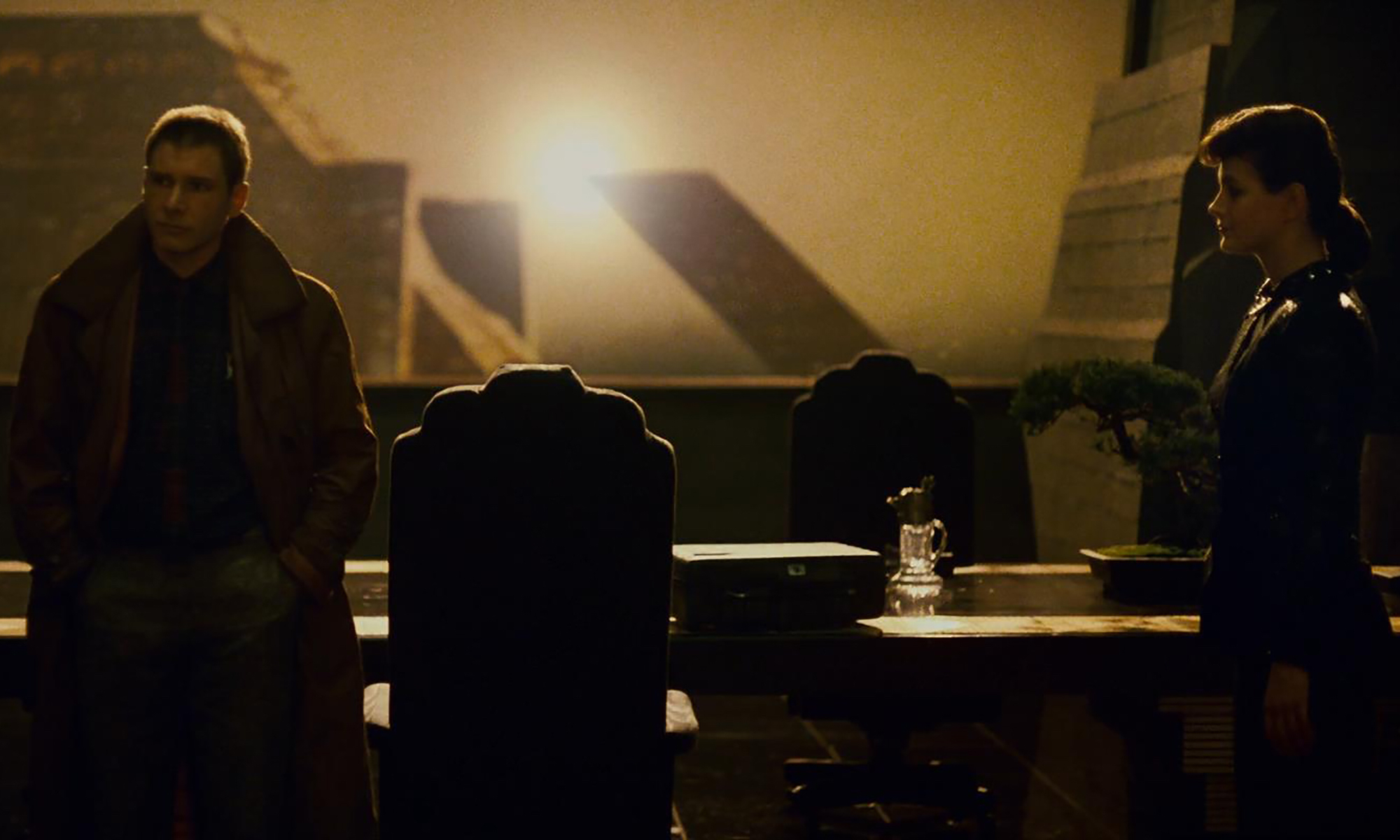"All this has happened before and will happen again."
Our Galaxy is a Big, Big Place
I have always been interested in galactic archaeology, but I don't think this is what they meant.
Did you know that dinosaurs lived on the other side of the Galaxy? pic.twitter.com/ngGCAu0fYU
— Dr. Jessie Christiansen @ #ExSSV (@aussiastronomer) August 28, 2019
Just Sayin'
I am convinced that Frank Lloyd Wright, Philip Glass, and I all lived past lives on the same alien planet.
Wright's architecture and Glass's music speak to me on a deep, fundamental level like no others.
The United States is a Lot Like Apple
Some commute thoughts from yesterday afternoon:
The United States is a lot like Apple. Once it had a really good product that everyone wanted. It was high quality, intelligent, well-thought out, and built well. Around the world everyone wanted to be like the United States. Like Apple, the US had a rough patch. (The US had the Civil War; Apple the John Scully years.) Both made their way through and came out the other side better than they were before. They both went on to become the beacons of excellence that everyone aspired to.
And then something happened. Suddenly both the United States and Apple decided they were the only ones who knew how things should be done and felt that because of their market share they could dictate the direction the rest of the world had to follow. It was hubris, pure and simple. We're The United States! We're Apple! If you don't like it, you don't have to follow but get the hell out of our way if you don't.
In a sane world, people would abandon these two entities completely, but billions were still addicted to the idea of both Apple and the United States—if not their current state—so with a only a few exceptions, the world still followed along—in some cases making the same foolish mistakes the US and Apple did in their "product lines" did because the neither couldn't be wrong…right?
I'm not directly comparing Tim Cook and the Orange Shitstain in the White House, by any means but I can see the correlation between bad decisions and the unrest we're seeing internationally. When Apple stopped including built-in floppy drives, it was fine. We knew it was outdated technology and needed to go. But then it arbitrarily got rid of industry-standard ports, forcing us into dongle hell. It stripped out the beloved Magsafe connector, and started soldering SSD and RAM onto the motherboards.
And then along came the butterfly keyboard.
While I can't draw specific parallels between any of these Apple blunders with things the United States has done over the last 70 or so years, you get where I'm heading with this. The good ol' "too big to fail" scenario.
Faced with the reality of what was happening to their reputation (not to mention their bottom line), Apple finally opened its eyes to what was happening and has made efforts to correct course. The question is, will the United States have its own 16-inch MacBook Pro/Mac Pro mea culpa moment or will it continue to stubbornly produce its own butterfly keyboard until it goes out of business or is crushed by a competitor?
Sometimes I Think We're Living in a Simulation and Just Running Lines of Code
Perhaps we are lines of code…
 Humans fancy that there's something special about the way we perceive the world, and yet we live in loops, as tight and as closed as the Hosts do, seldom questioning our choices…" ~ Doctor Robert Ford, Westworld
Humans fancy that there's something special about the way we perceive the world, and yet we live in loops, as tight and as closed as the Hosts do, seldom questioning our choices…" ~ Doctor Robert Ford, Westworld
This quote has been rolling around my head lately, leaving me amazed at its truth. Have you thought about your daily routine? I know my weekday mornings especially are locked into the same basic loop day in and day out, as if running lines of code from a script. Can I change it? Of course I can, but it snaps back to what it was if the new routine doesn't prove useful. The script changes on its own over time in large and small ways, but the basic…functionality…remains unchanged.
There are many other examples of this script-running in my life. What about you? Can you truly say you're "drastically off-narrative"?
Something to Chew On
Myths, Gods, and the Younger Dryas Cataclysm
Dodging Bullets
Having just wrapped up HBO's Chernobyl, and now making my way through NatGeo's The Hot Zone, it makes me wonder how many other near-humanity-ending events have happened over the last 70 or 80 years that were averted at the last minute that we may never know anything about…
Not Feeling Very Positive These Days
I keep thinking that good, rational people are going to exert their control as the responsible adults in the room and wrest control of our country back from the evil, psychotic, racist, child-monsters currently occupying the echelons of government. But with each passing day and each thumbing-of-their-noses to the Rule of Law, I'm coming to the sad, sackcloth-rending realization that this is never going to happen. We are witnesses to the decline and fall of the United States of America—and truth be told, probably all of western civilization. "All this has happened before and will happen again."
We have a demonstrably insane man occupying the White House, one tiny hand hovering over the big red civilization reset button, while methodically dismantling everything this country has built over the past 240 years with the other. What surprises me the most is the rapidity with which this destruction has been allowed to occur.
I had hopes that the newly elected Democratic Congress—hobbled as they are by having to deal with a solidly Republican Senate—would effect at least some change; that they would be able to at least lightly apply the brakes to this out of control administration and yet, except for a very few notable exceptions, all they're doing is politely asking that the Orange Menace stop steamrolling over anything and everything that made this country the envy of the world for so long.
Let's face it: the Russian Wig Stand is old. If he wasn't in such close proximity to the nuclear football I'd rest a little easier knowing that the vast majority of us would outlive him and survive long enough to start putting the pieces back together of what used to be our country. But I'm not so sure any more.
The 70% of the country who are not racist and certifiably insane are counting on the hope that 2020 will take care of the profound mistake that was made in 2016. I hate to be the bearer of bad news, but I think they're putting way too much faith in the belief that there will be an election next year. Trump is a sociopath, a malignant narcissist. Even if there isn't some manufactured crisis where he can issue an Executive Order to suspend elections, do you honesly think he'll voluntarily give up the Presidency even if he loses? And considering the Russians—or whoever is responsible for him occupying that office in the first place—have had four additional years to hone their psyop and hacking skills, who's to say he won't "win" again, no matter who actually receives the greatest number of votes?
The only thing that gives me the tiniest glimmer of hope is the knowledge that no dictator—or wannabe dictator—ever holds onto power forever. Even the mythic AntiChrist was prophesied to maintain control for only a few short years, so it's guaranteed that both Trump and his puppet master will end up worm food. That doesn't mean they can't wreak havoc; they can and will, but even that will come to an end.
And while the Bloviating Orange Anus is trying his best to fill every position of government with people as vile as he is, damn few of them actually last in those positions. Who knew working for the monster could be so universally disagreeable?
Be thankful it is. And be thankful the vast majority of them are incompetent fools. While things are bad and have the potential for getting much worse, imagine how truly awful it would be if Trump or his minions were actually competent at what they did?
That's not to say that a great deal of damage cannot be wrought by incompetency and enabled by the other wholly owned subsidiaries of the Russian government and those they have enough dirt on to maintain control of (I'm looking at you, Mitch McConnell and you, Miss Lindseybelle Graham).
If we are indeed more than just flesh and blood, if we are—to paraphrase Yoda's famous admonition—"luminous beings, not this crude matter," then it's a little easier to step outside this madness and simply embrace the philosophy that we all incarnated in this place and time to witness humanity vomit up thousands of generations worth of hate and ultimately self-immolate. And with more stars in the heavens than gains of sand on all the beaches of earth, it's not like there aren't other worlds and other civilizations we can't move on to when we're done here—hopefully not repeating the same mistakes me made in this here and now.
I'm a little too young to be a part of the generation of school children who grew up with "duck and cover." I was a toddler during the Cuban Missile Crisis, but thanks to popular culture, the fear of nuclear annihilation remains firmly planted in my consciousness, although it wasn't until November 2016—suspecting Trump to be completely batshit insane even then—that worries of dying in an atomic conflagration returned to the forefront of my awareness.
When I was in high school, I had a nightmare that remains with me to this day. I was standing on the front porch of a house I'd never lived in, talking with my mother. The subject of the end of the world (and the Second Coming of Christ—I was pretty traditionally religious in those days) came up. And almost the moment we started talking about it an incredible boom was heard and the sky cracked. I've thought about that for years, and have been keenly aware to not move anywhere that had the type of front porch present in my dream…until we moved into this place. While Mom is now gone ten years, I am living in a house with a front porch similar to that dream, and while the view wasn't as expansive (there's a huge tree in the yard not an open field across the street as was in the dream), there are now lots of women who could easily stand in metaphorically as a mother-figure in my life that I could find myself talking to out there. I'm now convinced the sky didn't actually crack; it was just the last thing I saw before dying: the pattern of ocular blood vessels seared into my retinas as a nuclear bomb detonated nearby.
I warned you I wasn't feeling very positive…
Well, Damn.
10 Reasons Aliens Won't Invade Earth
I Just Wanna Go Home
That's a thought that's been darting in and out of my consciousness going on at least five or six years now.
Even when I'm home.
I first noticed it after we moved to Denver. Understandable, since I'd just uprooted my entire world and was feeling very unmoored. But even three and a half years after returning to Phoenix it still hasn't gone away. By all accounts this little brick house we've occupied for the last three and a half years is home, and the thought of having to move out in a little over a month's time if I don't find work is profoundly distressing, but still I find myself sitting at my desk, or watching television, or doing the laundry and out of nowhere that thought will pop up, often accompanied by a profound sadness at the direction the world and my life has taken lately.
But if you ask me to describe the "home" I want to go home to, I'm at a loss for words. If anything, I don't think it's a place per se, but rather simply a sense of security and…settledness that has been conspicuously absent since we initially left Phoenix. Compound that with the feeling the entire world has become a powder keg that's just waiting for someone to light a match and well…you get an idea.
Living Vicariously Through the Lenses of Others
One place I have wanted to see since I was in my early 20s was Egypt. The pyramids, the ancient monuments…they've always been like a siren's call. Unfortunately, I never made it while I had the energy (and the lithe body) that would have allowed me to navigate the tunnels and chambers of the Great Pyramid, and now it's all but certain I'll never see Luxor, or Abu Simbel, or Karnak with my own eyes. With the ongoing instability in the region over the past four decades, I've always been concerned about the safety of traveling to the country, but at this point, with the standing of the United States dropping precipitously with each passing day Orange Twitler is allowed to remain in the White House, I think I'd be too frightened to travel at all as a US citizen.
But there is, I discovered, a vicarious alternative to being limited to the stock photos published in books of the ancient monuments, something I stumbled upon quite by accident.
One day I opened Instagram, and one of the many hot, bearded "Instagram models" I follow was posed in front of the Temple Complex at Luxor. I clicked on the geo location link and my screen filled with hundreds of pictures of the temple—with views of the complex I'd never seen before.
Naturally this led me to the great pyramid. And the temple of Ramses II at Abu Simbel. And Karnak. Even a generic #egypt hashtag showed me ancient wonders from a perspective I'd never seen before. I was hooked. The multitude of tourist photos posted to Instagram was showing me Egypt in a totally new way.
Here are a few that caught my eye…

























I can't help but wonder what the people who built these monuments were like. Were they like us, with the same wants, needs, and desires? What drove them? What inspired them? Did they suffer the same petty jealousies and insecurities that we do today? Were they as driven to buy, sell, and own stuff as we are? Despite their apparent lack of "technology" were they actually more advanced in certain areas than we are? Did they possess esoteric knowledge we lack, or were they as clueless about the ultimate meaning of "Life, the Universe, and Everything" as we are now?
It's Kind of Sobering
It's kind of sobering to realize that most—if not all—of the adults I knew as a child (including some beloved teachers) are probably now dead.
Turn Back Time
Have you ever thought about that sci-fi trope of going back in time to kill baby (fill in the blank – in most cases, Hitler)?
For the sake of argument, let's say that it's possible. You go back and successfully take Hitler out of the equation. What then? You immediately change all the future timelines of anyone and everything that Hitler touched. Yes, you saved the lives of 6 million Jews but it could then be argued that there'd be no need for the state of Israel to be formed. Einstein and German rocket scientists remain in Germany, leaving the very real possibility that the German flag would be flying on the moon, not to mention they'd most likely be the first country to possess a nuclear weapon.
No World War II, no baby boomer generation, and probably none of the myriad scientific advancements that came out of the US and its allies because of the war.
My view of this thought exercise is that someone will rise fill the void to recreate the timeline as much as possible. If there's no Hitler (or Trump), there would be someone very much like him that brings about the same general timeline that you attempted to change.
And who's to say someone from our future has not traveled back to our time to take out someone who creates a future hell?
What say you?
Where is Everybody?
Fifty Solutions to the Fermi Paradox and the Problem of Extraterrestrial Life
Stephen Webb
Stephen Webb is a physicist working at the Open University in England.
Fermi's Paradox:
Enrico Fermi, in response to a lunch time discussion about extraterrestrials, asked the question "Where is Everybody?" (i.e. where are extraterrestrials). This became known as the Fermi Paradox (1950).
Given the vastness of the universe (around 1022 stars), the age of the universe (13 billion years), and the universal laws of chemistry and physics, many assume that life must be present elsewhere in the universe.
The Fermi Paradox. (1) According to the Copernican Principle, there is nothing special about Earth or humanity, so whatever is true here should be true elsewhere in the galaxy. (2) Following this reasoning, Frank Drake predicted the existence of tens of thousands of advanced extraterrestrial civilizations (ETC) and Carl Sagan likewise predicted perhaps a million ETC. Such estimates are typically based on the Drake Equation (1961). (3) At least some of these ETC's must be millions or even billions of years more advanced than us. (4) Given some very reasonable assumptions, even one such ETC could colonize the entire galaxy in as short as 2-5 million years or more conservatively 10-60 million years. (5) If ETC's can spread so rapidly, they should have already reached Earth (or at least we should have detected their existence). Given that there is no definitive evidence (direct or indirect) that we have been contacted by any of these civilizations, then something must be wrong with this chain of reasoning.
If there are a billion ETC's, then the nearest one would be around 300 light years away. If there are only a thousand ETC's, then the nearest one would be around 1,000 light years away.
They Are Here:
This class of solutions posits that advanced extraterrestrial civilizations exist and have visited or are visiting. This is the most popular interpretation among the general populous.
1) They Are Here and They Call Themselves Hungarians
A tongue-in-cheek explanation for famous Hungarian scientists (e.g. von Neumann)
2) They Are Here and Meddling in Human Affairs
Flying saucers, UFOs, etc. are extraterrestrial spacecraft
3) They Were Here and Left Evidence of Their Presence
"Face" on Mars, backside of the Moon, etc.
4) They Exist and They Are Us – We are the Aliens!
Panspermia
5) The Zoo Scenario
A no interference "Prime Directive" is in effect
6) The Interdict Scenario
The presence of many civilizations prevents spreading to Earth
7) The Planetarium Hypothesis
We are inside a giant computer simulation (e.g. like movies Matrix and Truman Show)
8) God Exists
They Exist But Have Not Communicated:
This class of solutions posits that advanced extraterrestrial civilizations exist but we have not made contact. This is by far the most popular interpretation among research scientists
9) The Stars Are Far Away
Long travel times between stars because of speed of light limits travel
Possible solutions: generation ships, hibernation, worm holes, etc.
10) They Have Not Had Time to Reach Us
Diffusion model of galactic colonization
11) A Percolation Theory
12) Bracewell-von Neumann Probes
Self-replicating robots explore the universe on behalf of the extraterrestrials
13) We Are Solar Chauvinists
They might favor stars very different from our own sun
14) They Stay at Home …
15) … and Surf the Net
They prefer virtual reality simulations rather than actual exploration
16) They Are Signaling But We Do Not Know How To listen
ET signals might not use light waves, e.g. gravity waves, neutrinos, tachyons, etc.
17) They Are Signaling But We Do Not Know at Which Frequency to Listen
The electro-magnetic spectrum is broad: radio, infrared, visible, x-ray
The period where a civilization is "radio-bright" (i.e. detectable by signal leakage) might be short
Different SETI strategies targeting different portions of the electro-magnetic spectrum
18) Our Search Strategy Is Wrong
19) The Signal Is Already There in the Data
20) We Have Not Listened Long Enough
If ETC's are be short lived, then detecting them would be difficult
21) Everyone is Listening, No One is Transmitting
22) Berserkers
Berserker probes would eradicate young civilizations to prevent later competition
23) They Have No Desire to Communicate
24) They Develop Different Mathematics
25) They Are Calling But We Do Not Recognize the Signal
26) They Are Somewhere But the Universe Is Stranger Than We Imagine
Aliens transcend physical matter or are exploring alternate universes
27) A Choice of Catastrophes
Perhaps advanced societies always destroy themselves: nuclear or biological warfare, overpopulation, nanotechnology run amok, environmental catastrophes, particle physics disasters, or nearby gamma ray bursts (GRB)
28) They Hit the Singularity
Given Moore's law (computing power doubles every 2 years), aliens might achieve transcendence prior to exploring the stars
29) Cloudy Skies Are Common
Delayed space exploration because of difficulties doing astronomy
30) Infinitely Many ETC's Exist But Only One Within Our Particle Horizon: Us
The particle horizon represents the farthest out it is possible for us to observe but the universe might be infinite in extent
They Do Not Exist:
This class of solutions holds that we are alone in the universe—no other ETC's.
31) The Universe Is Here for Us
If the number of "difficult" steps in the development of advanced life is too large, advance life might not appear before the parent sun becomes too unstable. For perspective, humanity appeared on early about halfway though through the sun's lifespan
Anthropic principle
32) Life Can Have Emerged Only Recently
Life cannot appear anywhere in the galaxy until certain elements build up to certain levels, so ETC's would not have started long before life started here.
33) Planetary Systems Are Rare
Some early models suggested the planetary formation required special circumstances and so would be rare but these models have been overturned
34) We Are the First
Life could not appear anywhere until sufficient quantities of certain elements had built up
35) Rocky Planets Are Rare
Some models suggested that rocky planet's like Earth may require the action of a gamma ray burst but there are more plausible models that do not require this event
36) Continuously Habitable Zones Are Narrow
The Habitable Zone refers to the distance a planet must be from the sun to maintain liquid water. The Continuously Habitable Zone is the region where liquid water is maintained for billions of years as the parent star changes in luminosity.
37) Jupiters Are Rare
Large gas giant planets may be common but they need to be in the right place and have a circular orbit to allow for habitable planets
38) Earth Has an Optimal "Pump for Evolution"
Extinction events (e.g. asteroidal collisions) make room for new life
39) The Galaxy Is a Dangerous Place
Black holes, supernova, and gamma ray bursts
40) A Planetary System Is a Dangerous Place
Snowball earth, super-volcanoes, and mass extinction events
41) Earth System of Plate Tectonics is Unique
Active plate tectonics is needed to recycle critical elements
42) The Moon is Unique
Our moon is necessary for maintaining stability, however, its formation requires very unusual circumstances
43) Life's Genesis Is Rare
44) The Prokaryote-Eukaryote Transition is Rare
Prokaryotes are the simplest organisms. Eukaryote cells are the basis for multi-cellar life
45) Toolmaking Species Are Rare
46) Technological Progress Is Not Inevitable
47) Intelligence at the Human Level Is Rare
48) Language Is Unique to Humans
49) Science Is Not Inevitable
Ancient science was developed by the Greeks (c. 500 BC) but modern science appeared late (17th-18th century)
50) Stephen Webb's Solution to the Fermi Paradox
It is likely that we are alone in the galaxy. Rather than a single solution (cause), it is likely some combination of the above listed solutions. Simple life (i.e. bacteria) may be common but we are likely the only advanced intelligent life.
In Anticipation of Next Sunday's Debut of Season 2 of Westworld
I am listening to the Season One soundtrack and it almost brings me to tears (especially Dr. Ford, Trompe L'Oeil, and Memories).
I want to live in that world. I want to live in a word to see humanity's creations achieve full consciousness—regardless of the outcome. I mean seriously, could they possibly things up any more than we have already?
I felt the same way about the short-lived series Caprica, which told the story of the creation of Battlestar Galactica's Cylons. That soundtrack was my go-to-sleep music for months. I finally had to clear my play-count from iTunes because it was just plain embarrassing.
What I Don't Understand…
…is how and why so many people of my generation—who were children in the free-love 60s, teenagers in the anti-war 70s, and came of age in the "Do What You Wanna Do" 80s—have turned into such ridiculous, conservative right-wing christian douchebags in adulthood.
That's the reason I haven't been to a single High School Reunion. With only two exceptions, (one a liberal gay I met in first grade and the other a slightly conservative-to-middle-of-the-road straight Jew who was one of my best friends in high school) I haven't kept in touch with anyone I went to school with. What little I have gleaned from cursory social media searches over the years has told me all I need to know and confirmed that I want nothing to do with any of those people.
I Give Up
Insomnia is an evil, evil thing.,
It's 3 a.m. I woke up about 90 minutes ago and haven't been able to get back to sleep. I tried all the usual tricks: clearing my head, consciously staring into the black void, counting my breaths, counting backward from 1000, and going to my virtual "happy place." I even took a goddamned Benadryl as a last resort and nothing. I reached the point where I couldn't get comfortable (one dog was planted firmly at shoulder level between Ben and I and refused to move), and was just tossing and turning. I didn't want to disturb Ben any more than I already had, so I decided to follow some advice I'd read once upon a time and just get up for a bit.
I'm hoping it works. Otherwise I'm facing having to function tomorrow on 3 hours sleep.
Among the many thoughts that poured into my head while I lay there in the dark was something I'd wanted to do for some time: pass on some history.
If you aren't the first owner/occupant of your current house, how cool would it be to receive an envelope in the mail from a previous occupant, chock full of photos of the house in years gone by—or even better, when it was new—along with a letter passing on some stories of things that happened while they lived there? I know I'd think it was the coolest thing ever.
I realized that one of the gifts of age is my ability to now do that for someone else. Actually, four someones. Two of the homes my family owned while I was growing up were brand new when we moved in. A third (a 1930s era bungalow now in a much sought-after historic district in central Phoenix) was only about thirty years old when we lived there. And finally, while I obviously have no "new" photos of the 200-plus year old farmhouse my grandparents owned in upstate Massachusetts from the 1950s to the 1970s, I do have many photos from that period as well as a few from the early 20th century that they'd acquired while living there.
All these photos are already scanned; all I have to do is print them out, write some letters, and mail them off.
People always say, "If these walls could talk." Well, I have in my power in at least four cases to compel that.
"I don't understand any of it. I never did."
In my mind, that is probably the most memorable quote from the 1970 film, Boys in the Band. It was spoken by the character Michael as he was relating his dying father's last words.
I first saw the film during my senior year in high school. I went with my then-"girlfriend," Jean. Not really having any media representations of gay life at the time, Boys in the Band—as bleak and depressing as it was—did offer a glimpse into at least some aspect of the life I was taking my first, tentative steps into—if only as a warning of what not to become. (I returned for a second screening on my own a week later, and Jean's response was, "Why?!")
But I digress.
As I've grown older, those words have rung more true with each passing year.
When I was in my 20s and 30s, I thought had it all figured out. I knew how life worked—even if it didn't always work out the way I intended. The cracks started appearing in that belief as I entered my 40s, and when cancer came out of nowhere and hit me up the side of the head mid-decade, I realized I didn't know shit.
 When you're twenty-one, life is a roadmap. It's only when you get to be twenty-five or so that you begin to suspect you've been looking at the map upside down, and not until you're forty are you entirely sure. By the time you're sixty, take it from me, you're…lost." ~ Stephen King
When you're twenty-one, life is a roadmap. It's only when you get to be twenty-five or so that you begin to suspect you've been looking at the map upside down, and not until you're forty are you entirely sure. By the time you're sixty, take it from me, you're…lost." ~ Stephen King
Guess I'm not the only one…
A Question That Needs To Be Asked…
https://twitter.com/voenixrising/status/861275093111943169
On The Possibility of Being Visited By Intelligent Alien Life
It's a long read and not exactly for those with short-attention spans, but well worth the time if you have some to spare.
From Reddit: via WilWheaton.com:
I am not going to address the actual Roswell landing, what I am going to address is any alien life coming to Earth at all. Ever.
I study astronomy as a hobby, I have ever since I was a kid. One of the questions anyone who studies astronomy will inevitably wonder is if alien life exists (it absolutely does/has/will) and if it has ever (or will ever) come to Earth (it has not, and will not). It's sad to be an astronomy lover and a sci-fi fan and know with such certainty that this has never occurred.
So let me explain….
THE SIZE OF THE GALAXY
This is not to be taken lightly or overlooked. The galaxy is absolutely enormous. I cannot stress that enough. Our galaxy is a barred-spiral galaxy, and looks something like this. So how big is that? Well…
- In terms of distances, the Milky Way is 1,000 light years "thick", and has a diameter of 100,000 – 120,000 light years. (As per NASA) So let's imagine the Milky Way as a massive cylinder in space, what is its volume? Well, volume of a cylinder = radius2 * height * pi. That gives us approximately 10 TRILLION cubic light-years. That's a whole lot of space, and that's not including the massive amounts of dark matter in the Milky Way or the massive Halo of stars that surrounds the Milky Way.
- So that is a hell of a lot of light-years, but what, exactly, is a light-year? In case you don't know what a light year is, it is the distance that light travels in 1 full year, which is about 5.8 trillion miles (or, 5,800,000,000,000 miles). The nearest star is 4.3 light years away, meaning it is about (4.3) x (5.8 trillion miles) away. NASA explains it quite well.
- So, again, let's go back to our imaginary cylinder that is the Milky Way galaxy. That sucker is 10 trillion cubic light years of volume. And a light year is 5.8 trillion miles. Therefore, every cubic light year is 2.03 x 1038 cubic miles. This means that the volume of the galaxy is 2.03 x 1051 cubic miles, which looks like 2,000,000,000,000,000,000,000,000,000,000,000,000,000,000,000,000,000 mi3. That is the volume of the cylinder that is our galaxy. (thanks to /u/jackfg, /u/stjuuv, /u/hazie, /u/Wianie, and everyone else who pointed out my earlier erroneous calculation!)
TRAVEL
Okay, you admit, the Milky Way galaxy is unfathomably huge. And, to top it off, it's only one of hundreds of billions of galaxies. BUT, as you correctly would point out, most of the "volume" we calculated previously is empty space, so you don't really need to search empty space for other lifeforms, you just need to look at stars and planets. Great point, but it gets you nowhere. Why? Well…
- Even thought we've cut down our search to just the stars, we still have the astronomical problem of actually getting to them. Traveling from the Earth to the Moon takes about 1.2 seconds for light. You can see it in a neat little .gif right here. So how long did it take our astronauts in a rocket-fueled spaceship? It took the Apollo missions about 3 days and 4 hours to get there. So a trip that takes light about 1.2 seconds would take a rocket-propelled ship about 3.16 days, give or take. It takes light 8 minutes to get to the Sun. It takes light 4.3 years to get to the nearest star. Now just stop and imagine how long that trip to the nearest star would take going at the speed it took us to get to the Moon. A dozen generations of human beings would live and die in that amount of time. The greatest technology we have and all of Earth's resources could not get these hypothetical astronauts even out of our Solar System. (And in doing so, the radiation would fry them like bacon, micro-meteorites would turn them to swiss-cheese, and so on).
- So, our hypothetical aliens are not traveling on rockets. They simply can't be. The distances are enormous, the dangers unfathomable, and they don't have infinite time to be getting this mission done. Remember when I said that galaxy is 100,000+ light years across? Imagine traveling that in something that takes generations to go 4.3 light years. There quite literally has not been enough time since the Big Bang for such a flight to be completed. So, clearly, anything making these journeys would need a method of travel that simply doesn't exist. We can posit anything from solar sails that accelerate a craft up to 99% the speed of light, or anything else that allows travelers to accelerate up to relativistic speeds in between star systems. The problem, however, is that acceleration/deceleration (as well as travel between these stars, maneuvering while in flight, and so forth) still takes years and years and years and years. And that's not including actually searching these star systems for any kind of life once you get there. You see, once you decelerate this craft within a star system, you still have to mosey your ass up to every single planet and poke around for life. You might think you could just look at each one, but it's not even possible for a telescope to be built that can see a house on Earth from the Moon, so good luck finding life when you're on the other side of the solar system (and that's if the planet's even in view when your spaceship arrives). And how, exactly, are you going to poke around from planet to planet? What will you do to replenish the ship's resources? You certainly aren't going to be carrying water and food to last until the end of time, and without the infinite energy of the Sun beating over your head, you're going to have a tough time replenishing and storing energy to be doing this mission even after you get as far as Saturn, where the Sun becomes significantly smaller in the "sky". So the logistics of getting from one star to the other are huge, unmanageable, a complete mess for propulsion systems of any kind. Everything Earth has could be pored into the mission and we wouldn't get out of the Oort Cloud. And even if we did, then what? Cross your fingers and hope you can replenish supplies in the nearest star? How are you going to keep going after that? How suicidal is this mission? And that's just to the nearest star. What happens if the ship needs repairs? How many of these missions can you send out? If you only send out one, you're looking at taking eons just to search 1% of our galaxy, but the resources to send out a fleet of these ships doesn't exist. And how will you even know they succeeded? Any communication they send back will take half a decade to get here because those transmissions move at light speed, and that's IF they manage to point their transmitter in the right direction so that we can even hear them. It would take us decades to even realize we'd need to send a second ship if the first one failed.
- Now remember how I said that the volume of the Milky Way wasn't relevant since you're just looking for stars and planets, not combing all of empty space? That wasn't 100% accurate, because now you're starting to realize that you actually have to traverse all of that empty space. To get from star to star requires crossing those unparalleled voids. That whatever-the-fucking-however-huge quadra-trillio-billions of miles is suddenly looking a bit more massive again. And keep in mind, all of these deadly, insurmountable problems I've laid bare are just getting to the nearest star from Earth. And there are a lot of stars in the Milky Way, as we will shortly see.
- EDIT TO INCLUDE DEATH: It's also worth noting that when traveling at relativistic speeds you are going to have an awful time maneuvering this ship. So what do you do when a rock the size of a fist is headed right for your vessel? You die, that's what, because you are not getting out of its way. And that's if you see it, but you most likely would never know. Micrometeors and space dust smaller than your pinkie-nail would shred your ship to absolute pieces. Space is not empty, it is full of small little things, and a ship with a propulsion system would slam into all of them on its journey. I cannot find the source, but a paper I read years ago proposed the smallest "shield" needed to safely do this on one trip would be miles thick of metal all around a ship, and that's only if the ship was as big as a house. Insanity. Propulsion systems will not work for this voyage if they're going that fast.
- THE POINT BEING: So clearly, at this point, we have to resort to magic. That's right, no-kidding magic. We're talking about Faster-than-Light travel, because anything else is utterly doomed. And honestly, there isn't much to say on FTL travel, because it's pure speculative magic. It's so crazy that in accomplishing it you create time-travel, time paradoxes, and you break all of special relativity into nice tiny chaotic pieces. But, as this is hypothetical, I'm going to grant you faster than light travel. No explanation, we'll just use MAGIC and be done with it, but if you're curious, here's some reading on the matter.
- Finally, we are going to keep all of this travel within the Milky Way galaxy. Why? Well, we're staying confined to just the Milky Way because, quite frankly, it's already an absurd scenario without magnifying all the problems by a magnitude of 100+ billion more galaxies. As stated earlier, there are hundreds of billions of galaxies (in fact, when Hubble looked out into a patch of sky smaller than your pinky nail, it saw 10,000 galaxies, but there are untold-numbers of galaxies too far away to see, so that number is the minimum in just that patch of sky. There's a lot of galaxies in the universe).
SO, to recap: our hypothetical aliens are from the Milky Way, they are searching in the Milky Way, and they can travel faster than light. PROBLEM SOLVED, right? Now our aliens will inevitably find Earth and humans, right…? Yeah, about that…
STARS AND PLANETS
Okay, so I've granted you not only that we aren't searching all of the massive volume of the Milky Way (just the stars), I'm now granting you faster-than-light travel (with no explanation or justification, but that's how we have to play this game). But I still haven't even brought out the big guns, because the biggest and most important question of all hasn't been addressed: How many stars and planets are the aliens actually looking through, just in the Milky Way galaxy? Well….
- There are anywhere from 100 billion – 400 billion stars in just the Milky Way galaxy. Determining this number involves calculations of mass, volume, gravitational attraction, observation, and more. This is why there is such a disparity between the high and low estimates. We'll go with a number of 200 billion stars in the Milky Way for our purposes, simply because it's somewhat in between 100 billion and 400 billion but is still conservative in its estimation. So our hypothetical aliens have to "only" search 200 billion stars for life.
- Now we're saying the aliens have faster than light travel. Let's, in fact, say that the amount of time it takes them to travel from one star to the other is a piddly 1 day. So 1 day to travel from 1 star to the next.
- Yet, we still haven't addressed an important point: How many planets are they searching through? Well, it is unknown how many planets there are in the galaxy. This Image shows about how far out humans have been able to find planets from Earth. Not very far, to say the least. The primary means of finding planets from Earth is by viewing the motions of a star and how it is perturbed by the gravity of its orbiting planets. We call these planets Exoplanets. Now, what's really fascinating is that scientists have found exoplanets even around stars that should not have them, such as pulsars.
- So our aliens have their work cut out for them, because it looks like they more or less have to search every star for planets. And then search every planet for life. So, again HOW MANY PLANETS? Well, we have to be hypothetical, but let's assume an average of 4-5 planets per star. Some stars have none, some have lots, and so on. That is about 800 billion – 1 trillion planets that must be investigated. We gave our aliens 1 day to travel to a star, let's give them 1 day per planet to get to that planet and do a thorough search for life.
- Now why can't the aliens just narrow this number down and not look at some planets and some stars? Because they, like us, can't know the nature of all life in the universe. They would have to look everywhere, and they would have to look closely.
Summary: So we've given our aliens just under 1 week per solar system to accurately search for life in it, give or take, and that includes travel time. We've had to do this, remember, by essentially giving them magic powers, but why not, this is hypothetical. This would mean, just to search the Milky Way for life (by searching every star) and just to do it one time, would take them approximately 3 BILLION years, give or take. That is 1/5 the age of the universe. That is almost the age of the planet Earth itself. If the aliens had flown through our solar system before there was life, they wouldn't be back until the Sun had turned into a Red Giant and engulfed our planet in flames. Anything short of millions of space-ships, with magical powers, magically searching planets in a matter of a day for life, would simply be doomed.
Oh, but wait, maybe they can narrow it down by finding us with our "radio transmissions", right? They're watching Hitler on their tvs so they know where to find us! Yeah, well…
ON VIEWING EARTH AND RADIO TRANSMISSIONS
Regardless of whether or not our magical aliens have magical faster-than-light travel, there is one thing that does not travel faster than light, and that thing is…. light. So how far out have the transmissions from Earth managed to get since we started broadcasting? About this far. So good luck, aliens, because you're going to need it. This is, of course, assuming the transmissions even get that far, because recent studies have shown that after a couple tiny light years those transmissions turn into noise and are indistinguishable from the background noise of the universe. In other words, they become a grain of sand on an infinite beach. No alien is going to find our tv/radio transmissions, possibly not even on the nearest star to Earth.
So what if they have super-duper telescopes? Well, the size it would take for a telescope to view the flag on the Moon just from Earth would need to be 650 feet in diameter. And that's if you knew exactly what you were looking for, and where, and were essentially on top of the thing. Seeing details of any planet like Earth from any distance outside the solar system is 100% impossible. Seeing details once inside the solar system would take massive telescopes, and even then you'd need to know where the planets are to look at, you'd need to know what you were looking for, and that's assuming the aliens you're looking for on those planets are just strolling around on the surface. After all, most of Earth is ocean and intelligent life could have easily evolved there and not on land. And what about underground? You need to study these worlds pretty carefully (though, granted, Earth has us just right up on the surface making it easier once you are actually staring right at the planet).
TIME
There is one final nail in this coffin and that is one of time. Human beings have only existed on this planet for the past few tens of thousands of years. We've only had civilization for 10,000 years. In other words, if the entire history of the Earth were represented as a 24 hour clock, humans have existed for a grand total of 1.92 seconds out of that 24 hour clock. The point is that this would mean an alien would not only need to find Earth within the entire unfathomable galaxy, they would need to find it within a specific time-frame. It's not as though we'll be here for billions of years while they search, and if they are even a fraction too early, we won't exist yet.
Think of it this way. If it "only" took the aliens 100 million years to comb the entire galaxy for life on Earth, they would have .0001% of that amount of time as a window in which they could find humans at all. To find human civilization is .00001% of that time. To find us as we are now is an even smaller fraction. In fact, the dinosaurs went extinct 60,000,000 years ago, so even if they make a return trip, and if they were last here when the dinosaurs went extinct, they won't be due back for 40 million+ years. And that's if we give them ultra-super-duper magical powers so they can scan the whole galaxy in "just" 100 million years.
So our aliens are not only finding our invisible planet in a crazy-huge galaxy, they are finding it in a VERY specific and narrow amount of time. Outside of that, they'd be far more likely to find our planet as a frozen wasteland, a molten slag-ball from pole to pole, or just find dinosaurs. Again, IF they found it at all, ever, which doesn't seem terribly likely in the first place.
SUMMARY
So, as discussed:
- It is impossible for aliens to directly view Earth, the planet, and certainly not details of it from outside the solar system.
- It is impossible for them to pick up transmissions from Earth even at our nearest star.
- Therefore they have to actually go solar system to solar system in order to hunt down life, even intelligent life.
- The distances they must travel are enormous.
- The number of stars they have to search is enormous.
- The window they have to find us in is extremely small, so that even if they made a return trip it would be long after we are extinct.
- Combining these amounts of time needed, the amount of space to be searched, and the TINY fractional window they have to accomplish this in, we are looking at something that is an impossibility compounded by an impossibility.
And that's not even getting into the fact that we're positing the aliens have existed for this long. How many alien intelligences are there in our galaxy? What if there's only one that ever pops up in any galaxy? What if there have been 1,000 others in the Milky Way but they're already all extinct? What if they don't exist yet? These are utterly unanswerable, which is why I don't go much into what the aliens are or how many there might be, but it does provide further layers upon layers upon layers of problems. The mess that one need sift through to even begin to hope for aliens bumbling into Earth and start probing us is enormous, unfathomable, immeasurable.
So, I hope you can now see why Roswell is pure crap. It's a roundabout way of getting there, but I can say with absolute certainty two things:
- Given the massive size of the universe and the time it has existed, it is 100% certain that alien intelligence exists (or has existed) somewhere else in the universe.
- It is 100% guaranteed they have never, and will never, find us on this planet.
EDIT: Some people balked at my 100%. To me, 99.99999999999999999999999999999999999999…% is 100%.
If you've made it this far, you're obviously interested in this subject and will find the entire conversation thread fascinating…
I Find This Sad, But At The Same Time…
…strangely reassuring and well worth a few minutes of your time to read in full.
Western civilization will completely collapse in the next 200 years
Hari Seldon is a fictional character in Isaac Asimov's Foundation series who studied broad patterns of human behavior, and through that study was able to predict the collapse of civilization. The general principle is simple: large masses of humans are similar to large masses of atoms in a gas. Predicting the behavior of any individual atom is nearly impossible, but the prediction of the behavior of a gas–how it will react to changes in temperature and pressure, for example–is simple and deterministic. You don't need to know how each individual atom will behave, because in the aggregate masses of atoms show statistical properties that are invariant. Isaac Asimov's premise in the Foundation books is that large masses of people are predictable for the same reason: the large-scale flow of action is driven by statistical factors that will cause predictable patterns to emerge, even if the behaviors of individuals cannot.
So call me Hari Seldon… because I've been looking at some patterns recently, and I'm convinced Western Civilization will completely collapse within the next 200 years.
Let's Play a Game
I call it Stupid or Don't Give a Fuck.
This is a discussion Ben and I were having the other day while driving home from lunch. We've both noticed an increase in the general assholery of our fellow Americans lately, both on the road and off.
We used to quickly dismiss it as just plain stupidity (left turns from right hand lanes, etc.) but the thought occurred to me the other day that it's more than just stupidity. I think that with everything going on in the world over which they feel they have no control, a lot of people have just developed an entitled, fuck-it-all mentality when it comes to the little things they can control.
"Why should I follow traffic rules when no one else does?"
"Why should I actually have my fast food order sorted before I get to the head of the line?"
"Why should I do x, y, z and maintain basic civility toward people when it's obvious no one else is and they're getting away with it?"
Now granted, there have always been self-important, entitled assholes:
But it seems that until last November this douchebaggery was just kind of simmering there, for the most part held in check by civil society.
Not any more!
The "election" of the Cheeto-faced Jizztrumpet and the ongoing train-wreck that has followed has unleashed all that pent-up effluent and has allowed it to run freely in the streets with its head held high. People who would otherwise be muzzled by basic standards of civil behavior can now be flaming douchebags to anyone and everyone without any fear of repercussion. Because if the President can get away with Treason, why do I have to play by the rules?
BECAUSE FOLLOWING THE RULES AND TREATING OTHER PEOPLE WITH RESPECT IS THE RIGHT THING TO DO, MOTHERFUCKERS.
So I would suggest start playing a game when you're out and about and see something that leaves you shaking your head in disbelief. Try and figure out if someone did something out of sheer stupidity or out of a misplaced fuck-it-all sense of entitlement.
Nostalgia

I've reached that point in our absence from Denver that when looking through photos of our time there I find myself feeling a bit wistful and catch myself thinking, "Was it really so bad?"
Human memory is a funny thing. We tend to remember only the good times and tend to gloss over or outright forget the bad ones. It took me years to get over San Francisco—and that departure was forced by circumstances, not something I particularly chose. Even now, officially absent from Baghdad-by-the-Bay for longer than the sum total of the time I lived there, I still occasionally feel a pang—albeit brief—of homesickness when running across a particularly beautiful photo of The City. (Curiously, my own photos from my time there do not elicit such feelings.)
So I'm sure the same thing will happen with Denver as time goes by. "Was it really so bad?" YES, Mark. Yes it was. Remember the night you got stuck in the snow on the way home from work? How about the continual, hellacious traffic and the horrific drivers? Remember all those times waiting at a bus stop (because you finally wised up and refused to drive to work when it snowed) in -8°F weather? For chrissake if nothing else remember the abysmal employment that both you and Ben had to deal with!
As I've mentioned before, we wanted an adventure, and Denver certainly provided that. And Sammy. Mustn't forget that Denver is where Sammy came into our lives! Sometimes I think that was the sole reason the Universe put us there in the first place.
Another Explanation For The Fermi Paradox

Trump's election and what he represents probably also explains why we have not been—at least openly—visited by any extraterrestrials. I mean, if you looked down on the creatures swarming over this planet who possess nuclear weapons, share the same DNA with each other and can't even get along with each other, would you want to drop in and say hello? Oh hell to the no! If anything, you'd quarantine this rock…
Wheels Within Wheels

"We live in loops as tight and as closed as the hosts do, seldom questioning our choices, content, for the most part, to be told what to do next." ~ Dr. Robert Ford, Westworld
I remember having one of those deep, philosophical discussions with a friend several years ago and the subject of reincarnation came up. He posited that reincarnation was indeed real, but that instead of moving on to new adventures in new timelines, we simply go back and do everything again and again, until—as he put it—we get it right. At the time that thought horrified me; it was like we were trapped in a never-ending Groundhog Day, but blessedly unaware that we'd passed this way before.
I've been thinking about this a lot now that the first season of Westworld has come and gone, and that one quote above stands out. I mean, it makes as much sense as anything else to explain our "reality."
But how would this work? How could you reincarnate again and again into the exact same timeline, only to unchangingly experience the same things again and again—and what about everyone else who you've interacted with?
I guess the only way I was able to wrap my had around it was to envision it as an infinitely complex series of interlocking gears. Your lifetime is one gear. Connected to that gear are the gears of everyone else in your life; everyone you've known or are yet to meet; and through those gears, the gears of everyone who has ever lived—or will ever live. You're all meshed together, but only certain segments of those gears actively interact with each other (i.e., your time in each other's lives).
Philosophically speaking, the only issue I have with this idea is that it doesn't allow for any change or growth beyond one's original storyline, something that is the antithesis of what we've come to accept as being a fundamental part of life and of being human.
But it does explain those occasional instances of Déjà vu, does it not?
Hello 2017

Never have I approached a new year with such trepidation.
Thought Of The Day
I'm going to need the finale of 2016 to have a dramatically uplifting and inspiring plot twist.
Some days…
…I feel like so much hate-based gasoline has been poured over this country planet that all it's going to take is one small match to set the entire thing blaze.
Maybe that is the reason we haven't been contacted by—or have heard transmissions from—any alien civilizations. Perhaps they all reach the point in their development that humanity currently finds itself, achieving an unprecedented degree of scientific enlightenment and standing at the brink of leaving their planetary cradle, only to have the technology spawned by that enlightenment allow bronze-age prejudices and hatreds—long simmering under the surface—to finally spew forth in all their base ugliness, causing the entire civilization to self-immolate.
I know that in the vastness of the universe, that couldn't have happened to every civilization, but I'm beginning to think it happens often enough that space-faring civilizations are very rare indeed and all their explorations reveal are the burnt-out husks of once-great societies littering the galaxies.
Alternate Universes
Ben and I were heading home the other day and as we were driving down Lincoln and crossed 22nd Street, I was reminded of a time—a lifetime ago, it seems—when my family almost bought a house in that neighborhood.
It was during eighth grade—or perhaps shortly after I'd graduated. Dad was rightfully proud of the work he'd recently done for Hallcraft on their new Biltmore Highlands subdivision, so one sunny Saturday we headed over to what seemed at the time to me like the far east side of the valley to check it out. I don't know how the talk started, but before I knew it we went from looking at the model homes to being shown one house in particular a few streets over that my parents were actually considering buying. It was a large, beautiful three bedroom, two bath place with a courtyard entrance, a spacious kitchen and a large family room with a fireplace. The bedroom that was to be mine was significantly larger than my current room, eliciting no small amount of excitement on my part. The room also had two windows instead of one.
My enthusiasm was tempered somewhat by the fact that it would now actually cost to phone my best friend (apparently calling from certain Phoenix exchanges to certain Glendale exchanges back in the day incurred wasn't free).
This move also meant that my sister and I would be transferring to a new school district, something I think caused my parents' eventual decision to bail on that house and that particular subdivision.
We did end up moving into a new home a few months later, actually only about a half mile south of where we had been living, so the seed had definitely been planted. I'm sure economics were also a factor; we got a much larger house for less money in Hallcraft's Bethany Heights than we would've gotten if we'd moved to Biltmore Highlands.
Ironically, even though my best buddy and I now actually lived closer to each other than we had previously with this move, after high school started we drifted apart and each went our separate ways. (I found out many, many years later that Neal—whom I'd known since 4th grade—transitioned to Angela sometime in our twenties. He'd always told me he'd felt like a girl trapped in a boy's body, so this did not come as a huge surprise.)
What does all this have to do with the title of this post? Well, I got to thinking how different (or perhaps not) my life would've been had we actually moved to Biltmore Highlands and my sister and I had been forced into a new school district.
Obviously, I would never have met the people or made the friends I did if I'd gone to a different school than the one I did, but I wonder if life post-high school would've actually been that different. I'd still have undoubtedly gone to the University of Arizona in Tucson and had similar experiences. Or would I?
A currently popular idea in cosmology is that there are an infinite number of universes, each one calving off and growing on its own, depending upon what choices are made. And not just your choices, but multiply that by the billions of other souls on this rock and it boggles the mind. Multiply that by the number of possible planets and potentially sentient beings in the universe, and it truly becomes an unimaginable number.
So it's always an interesting "what if" game to play. What if I'd actually gone to ASU instead of UofA, stayed in school and gotten my degree? What if I'd kept on going the night I walked out of The Joshua Tree and never met Dennis? What if Bernie and I never visited San Francisco—much less moved there?
I suppose there's a certain satisfaction in knowing that if this multiverse idea is in fact reality that somewhere, maybe as close as the orbit of an electron—there are universes where Hitler was never born; where JFK was never assassinated; where you are just as likely to be President of the United States as you are to be living in a cardboard box under an overpass; a world where the Dark Ages never occurred and Christianity never gained a foothold; a world where you actually bought that Apple stock in the 90s; a world where mankind has already colonized the solar system and is moving out to the stars…
A Skeptical Look at the Possibility of Life on Other Planets
From Skeptic Ink:
There were several interesting articles and images that all gave me the inspiration for this post. So, let's talk about the idea of life in our universe beyond our solar system.
The first question to think about is how many other planets are there. The answer is lots. No, "lots" doesn't even begin to cover it. I got this image from NASA (click the image to the source… it's big).

Phil Plait, over at Bad Astronomy did a calculation to determine just how many galaxies Hubble could see. Note that isn't all the galaxies in the universe, just the ones the Hubble Space Telescope could potentially see.
First he calculated how many galaxies were in a small piece of the above image. It's about 50. That piece was 1/100 of the actual image. So, the image above contains about 5,000 galaxies.
Then he found out that the image is 10 square arcminutes. The entire sky is about 150 million square arcminutes, which means that there are about 15,000,000 pieces of sky the same size as the above image. At roughly 5,000 galaxies per, we get a total of 75,000,000,000 galaxies. That's 75 billion visible galaxies with the Hubble.
The Milky Way has about 100 billion stars (though some estimates approach 400 billion). If we assume that an average galaxy has 100 billion stars, which is fairly safe, then we get 100 billion * 75 billion stars in the universe.
That is 7,500,000,000,000,000,000,000 or 7.7×1021 stars.
How many could potentially support life? Well, a lot depends on A) how you define life and B) what conditions we consider for that life.
Right now, we know of only one planet that unambiguously has life. There is significant potential for life elsewhere in our solar system. Though it would likely be limited to the bacteria level or extraterrestrial equivalent. Still, if we find life on Europa, Titan, Enceladus, or even Mars, then the options for life on extrasolar planets just got even better.
But let's talk about that life on other planets. How would life appear?
Well, that's an entire topic of research called Origins of Life (OOL). The results are very impressive so far. There are multiple ways to get the basic organic compounds needed for life, without life needing to be present. One of the main sticking points has been ribose sugars, the main component in the backbone of DNA and RNA. Some new research suggests that is much less of a sticking point than previously thought.
Cornelia Meinert (Meinert 2016) and her team discovered that a relatively simple reaction, catalyzed by ultraviolet light, forms ribose and a variety of other sugars… in space.
Ice is common in space, we regularly track large balls of space ice and even landed on one of them. So, that's water. Another needed component is ammonia, which seems to be common in space as well. Finally, we need a source of carbon and that comes from methanol (methyl alcohol). Which is, you guessed it, common in deep space. These are all inorganic sources of these materials, no life required.
The idea behind the paper is that a planetary nebula, that is a pre-solar system, has all these materials much more scattered than in a solar system with planets. There's a lot of supporting evidence for this in our own solar system.
In our solar system, excluding the sun, Jupiter has 3 times the mass of every other planet combined. It has methane, ammonia (including ammonia ice), even benzene rings (link to Voyager probe results). So, in a pre-planetary nebula, all of these compounds would be present.
Much like the famous Miller-Urey experiment, the researchers took these compounds, exposed them to near space temperatures (78 Kelvin, which is -319 F), hit them with UV light, then warmed them up. The result was 56 unique compounds (not including the isomers of those compounds), most of which, we would think required life to manufacture.
The question then becomes, how did the material formed in space get to Earth. That's where theLate-Heavy Bombardment comes in. The hypothesis is that between 4.1 and 3.8 billion years ago, the inner planets underwent a very heavy period of asteroid and comet impacts. The suggested impacts are stunning. By extrapolating lunar impacts to Earth, the estimate is over 20,000 impacts large enough to form a 20 kilometer diameter crater. As an example, Meteor Crater in Arizona is just over 1 kilometer in diameter.
Larger impacts would also have happened, including multiple impacts resulting in 5,000 kilometer craters.
This is in addition to other research about the common origin of RNA, lipids, and proteins.
The point is, we find these compounds all over the universe. And the universe is truly immense. It is the height of arrogance to assume that life only exists on Earth and that humans are the only intelligent species in the universe.
Now, a discussion about whether we would ever find that other life is a totally different prospect. But even with one planet per galaxy with life, that's 75 billion planets with life in our universe.
